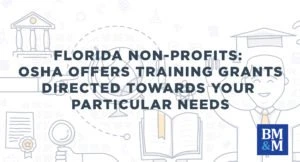
Important operational and risk-management elements of both for-profit and non-profit organizations are employee health and safety. The principal Federal agency regulating those matters is the Occupational Safety and Health Administration.
One of OSHA’s activities is to support employers’ training efforts to prevent work-related injuries and illnesses. The Susan Harwood Training Grant Program is geared specifically towards non-profit entity employers. As described by OSHA:
OSHA awards grants to nonprofit organizations on a competitive basis through its Susan Harwood Training Grant Program. Grants are awarded to provide training and education programs for employers and workers on the recognition, avoidance, and prevention of safety and health hazards in their workplaces and to inform workers of their rights and employers of their responsibilities under the Occupational Safety and Health (OSH) Act. Solicitation for the Susan Harwood Grant Program is a function of Congressional budgetary approval and appropriation by the Department of Labor.
And further:
The types of grants solicited each year vary. Grants solicited in the past include Capacity Building grants, Targeted Topic, and Training Materials Development.
- Capacity Building grants focus on developing and/or expanding the capacity of an organization to provide safety and health training, education and related assistance to the targeted audiences. The organization must provide financial plans to continue capacity beyond the grant period. Two types of capacity building grants have been awarded: developmental and pilot.
-
- Developmental grants support and assist organizations who through their past activities have established a capability to provide occupational safety and health training, education, or related assistance, but where the organization wants to expand their training capacity into a new safety and/or health topic area.
- Pilot grants are intended to assist organizations able to demonstrate a potential for meeting the objectives of this program, but that need to assess capabilities, needs and priorities; and formulate objectives before moving forward into developing a full-scale program.
- Target Topic grants focus on training of workers and/or multiple employers on occupational safety and health hazards associated with one of the OSHA selected training topics.
- Training Materials Development grantees are expected to develop, evaluate, and validate classroom quality training materials on one of the OSHA selected training topics.
To apply for a Susan Harwood grant:
The Harwood solicitation for grant applications (SGA) opportunity is published in the Federal Register. Once published, the SGA is posted on the government-wide Grants.gov web site. Grants.gov allows organizations to electronically find and apply for Federal grants. Grants.gov is the single access point for over 1,000 grant programs offered by all Federal grant making agencies. Harwood grant applicants are required to submit their grant applications electronically through Grants.gov. To apply organizations must complete the Grants.gov registration process, which takes 3 to 5 days. Grant applications cannot be submitted until the registration process has been completed. See Helpful tips for improving your application.
For further information about Susan Harwood training program grants (and the source of the quoted texts above), please click here.
=====================
To consult with an experienced business law lawyer today
855-780-9986
For more information, call Philip N. Kabler, Esq. of the Gainesville, FL office of Bogin, Munns & Munns, P.A. at (352) 332-7688, he practices in the areas of business, real estate, banking, and equine law. He has taught business and real estate law courses at the University of Florida Warrington College of Business Administration and Levin College of Law. He is a member of the Greater Gainesville Chamber Board of Directors, and is the Immediate Past President of the Eighth Judicial Circuit Bar Association.
NOTICE: The article above is not intended to serve as legal, financial, or investment advice, and readers should not rely on it as such. It is offered only as general information. Readers should consult with an attorney regarding their legal matters, as every situation is unique.
Call or Submit Our Consultation Request Form Today





